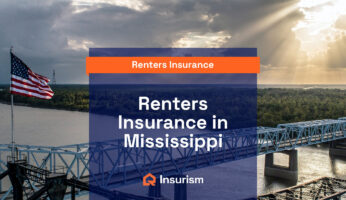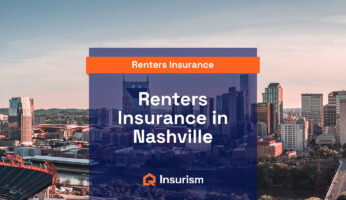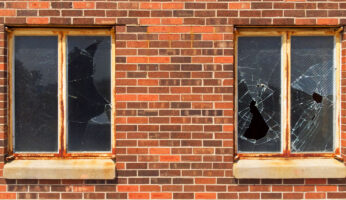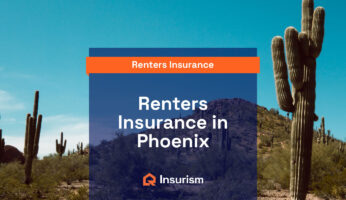Table of Contents
- How renters insurance covers hurricane damage
- The two types of renters insurance hurricane coverage
- What renters insurance covers during a hurricane – detailed breakdown
- What renters insurance doesn’t cover during a hurricane
- For complete hurricane coverage, consider buying flood and windstorm insurance
How renters insurance covers hurricane damage
Renters insurance doesn’t specifically cover hurricanes — if you open up your renters insurance policy, you probably won’t find the word “hurricane” anywhere.
However, renters insurance does cover many types of damage, known as covered perils, that hurricanes can cause. For instance, renters insurance covers lightning, wind damage, and hail.
Other covered perils include:
- Fire
- Explosions
- Falling objects (e.g. trees)
- Non-flood water damage
- Burst pipes
For a complete list of covered perils, see our guide on what renters insurance covers.
If your things are damaged by any peril listed above, regardless of whether the root cause was a hurricane or not, your renters insurance company will reimburse you for the damage.
Hurricane damage that isn’t covered
Renters insurance doesn’t cover the following types of hurricane damage:
Flooding
Renters insurance doesn’t cover floods, including those caused by hurricanes. To get flood protection, you need to ask your insurer whether they offer a flood insurance plan. We discuss this more at the end of this article.
Damage to your home or car
Renters insurance never covers cars. If a hurricane damages your car, you’ll need to use your auto insurance to pay for it.
Renters insurance also doesn’t cover your home, i.e. the actual building that you live in. As a tenant, your unit belongs to your landlord, so your insurance doesn’t need to cover it.
Note that if your building is damaged by a hurricane — for instance, if the wind knocks a hole in your roof or shatters your window — your landlord has a legal obligation to fix the damage within a reasonable timeframe (and to pay for it themselves). If they’re slow about getting it repaired, you’re allowed to insist.
Regional exclusions for wind damage
Some renters insurance providers write special exclusions into policies that they issue in hurricane-prone areas. For instance, even though renters insurance usually covers wind damage, some insurers in Florida exclude it from coverage.
Check your policy to see if any of these special exclusions apply to you, and call your insurer if you aren’t sure. This is particularly important if you live in the Southeast or another area that sees a lot of destructive storms.
The two types of renters insurance hurricane coverage
All renters insurance policies provide two types of coverage that protect you from the financial risk posed by hurricanes:
1. Personal property coverage for hurricane damage
As mentioned, if your personal property is damaged by a covered peril, your insurance provider will reimburse you for your financial loss up to your policy’s limit (a number that you pick when you buy your policy).
Your personal property includes your furniture, electronics, appliances, clothes, and anything else you own, whether or not it’s actually located in your house. Renters insurance covers items in storage units, as well as items stored inside your car, even though it doesn’t cover the car itself.
How your insurer will reimburse you for hurricane damage
The payout you’ll receive when you file a claim depends on the type of renters insurance policy you have:
- Replacement cost: With this type of policy, your insurance provider will pay for brand new replacements for any items damaged during the hurricane.
- Actual cash value: With this policy, your payout will be whatever the items were worth when the hurricane struck, i.e. their “eBay value.”
2. Loss-of-use coverage for hurricane damage
If the damage from the hurricane is severe enough that it renders your home uninhabitable, your renters insurance will cover your additional living expenses, including your hotel bills and meals, until you can move back in.
In the insurance world, this is called loss-of-use coverage. It’s meant to help you maintain your day-to-day standard of living, so don’t go crazy — if you check into a five-star luxury hotel, your insurer probably won’t cover it.
When can you make a loss-of-use claim due to a hurricane?
There are several circumstances where you can make a loss-of-use claim after a hurricane.
If your home is uninhabitable due to damage caused by covered perils
Renters insurance only provides loss-of-use coverage for hurricane damage when the damage was a covered peril.
For instance, because renters insurance covers fires, if a hurricane causes a short-circuit that starts an electrical fire, your loss-of-use coverage will kick in and pay for you to relocate somewhere else until the damage is fixed and it’s safe to return to your home.
However, if your home becomes uninhabitable due to a hurricane-related flood, you can’t make a loss-of-use claim.
If you’re prohibited from accessing your home by authorities (due to a covered peril)
Sometimes hurricane damage is so widespread that the authorities will legally prohibit you from staying in your home until your area or neighborhood is deemed safe.
When this happens, most policies provide something called prohibited use coverage, which will pay for your living expenses for up to two weeks.
To qualify for this coverage, the damage must have been caused by a covered peril. So if a hurricane-spawned tornado ravages your neighborhood, your policy will kick in (because wind damage is covered). If a flood caused the damage, then you’re out of luck, because floods are excluded perils.
Note that prohibited use doesn’t include mandatory evacuations before the hurricane struck, although your insurer might still approve your loss-of-use claim if you ask them. There’s no harm in trying.
When in doubt, check with your insurer
Loss-of-use claims can get murky. After all, hurricanes always cause a mix of covered perils (e.g. wind damage and falling objects) and excluded perils (flooding), which can make it hard to tell whether your claim will be approved or not.
Our advice: Contact your insurance company and explain the situation.
In general, we recommend being cautious about filing claims, because if you file too many, your insurer might drop your policy or raise your monthly renters insurance premiums, but they’re unlikely to do that if you simply inquire about a hurricane-related loss-of-use claim. The worst they can do is say no.
What renters insurance covers during a hurricane – detailed breakdown
Hurricanes can cause a lot of different types of damage, some of which are covered, some of which aren’t.
Here’s a list of hurricane-induced perils that are usually covered.
Wind, hail, and tornadoes
Renters insurance usually covers common weather-related perils like wind damage, hail, and tornadoes.
However, if you live in a coastal state like Florida, you should check your renters insurance policy. Like we said, some providers write these perils out of their policies in states that see a lot of extreme weather.
If your policy doesn’t fully cover these weather-related perils, you can look into buying additional insurance, such as windstorm insurance. Ask your insurer for details.
Fire and lightning
Renters insurance virtually always covers fire and lightning damage. (Believe it or not, hurricanes can start fires, usually by way of a short circuit.)
Explosions
Hurricanes can trigger explosions by flooding your house with water containing chemical products, such as chlorine or petroleum.
If this happens, renters insurance will reimburse you for any damage to your belongings caused by the explosion up to your policy’s limit.
Falling objects
Powerful windstorms can cause heavy objects like trees to fall on your roof and severely damage your home and the things inside.
Because falling objects are a covered peril, renters insurance will cover it if they damage your things, although remember that your policy won’t cover damage to your actual building — your landlord needs to pay for that.
Non-flood related water damage
While renters insurance doesn’t cover floods, it does protect you against any non-flood-related water damage.
In the insurance world, a flood is a situation where there’s water on the ground outside and it rushes into your home. Internal disasters (like burst pipes) aren’t considered “floods,” and are usually covered.
Types of water damage covered by renters insurance
- Burst pipes: As mentioned, burst pipes are always covered by renters insurance.
- Sewage backups or sump pump failures: Technically, these aren’t covered by standard renters insurance policies, but they are covered by a very common renters insurance rider called a water backup rider. Most insurers offer this rider, and we recommend getting it if you live on the ground floor of your building.
- Rain damage indirectly caused by a covered peril: If a fire, a falling object, or another covered peril damages your roof and allows water to leak through and ruin your stuff, your insurer will pay for the damages. You’ll need to clearly explain to them how the damage can be traced back to the covered peril.
- Plumbing leaks caused by a covered peril: If a hurricane-related covered peril (like a gas explosion) damages your pipes, any damage caused by the leaks will be eligible for coverage.
- Mold: Similarly, renters insurance usually covers mold when it’s traceable back to a covered peril. If any of the events above ultimately lead to a mold infestation in your unit, your provider will probably cover it.
Always document the damage
Since hurricane damage can have multiple causes, pinpointing a specific one can be tricky. It’s ultimately up to your insurer whether or not an incident is covered. This makes it very important to document the damage with photos so that you can make your case to them as convincingly as possible.
What renters insurance doesn’t cover during a hurricane
Like we mentioned earlier, renters insurance doesn’t cover hurricane-related flooding, including floods caused by storm surges and burst levees and dams.
This means that your provider won’t reimburse you for any of the following, so long as they were caused by the flood:
- Mold and mildew
- Damage to appliances
- Electrical damage
- Damage to furniture
- Destruction of books, documents, and valuables
Why doesn’t renters insurance cover floods?
Renters insurance doesn’t cover floods or storm surges because they cause very widespread damage, often to hundreds of thousands of homes at a time.
Reimbursing people for flood damage can put a strain on insurance companies’ finances. Sometimes, this is a problem even for huge renters insurance providers like State Farm and Allstate that keep hundreds of millions of dollars of cash on hand.
Insurers can keep the price of renters insurance low because it doesn’t cover disasters like floods. If your policy included flood insurance, it would be a lot more expensive.
For complete hurricane coverage, consider buying flood and windstorm insurance
To get full coverage against hurricane damage, you need to purchase extra insurance that protects you against flooding. If you live in a hurricane-prone state like Louisiana or Florida, you might also need to buy windstorm insurance if your policy has special exclusions for wind damage.
Flood insurance
To protect your personal belongings from water damage caused by flooding, consider purchasing flood insurance.
Many insurance providers offer flood insurance through the National Flood Insurance Program (NFIP), a government insurance program that offers up to $100,000 in property coverage. The average monthly premiums for a flood insurance policy are about $58 per month or $699 per year, but the price fluctuates depending on where you live.
Unfortunately, NFIP flood insurance doesn’t offer loss-of-use coverage. This means that if a flood makes your home unlivable, your insurer won’t cover your hotel stay. If you live in an area that’s susceptible to floods, plan for these expenses in advance.
Windstorm insurance
Most renters insurance policies list windstorm damage as a covered peril, except for some providers in coastal areas.
If you have a policy that excludes wind damage, consider buying a wind damage endorsement or a separate windstorm insurance policy. Because this is a fairly niche type of insurance, call your provider and see if they offer if. If not, ask if they can refer you to a company that does.
Can I get hurricane insurance?
No, unfortunately, there’s no such thing as “hurricane insurance.” Sometimes people use the term, but they really mean a collection of unrelated policies, such as renters insurance, flood insurance, and windstorm insurance. Together, these protect you pretty comprehensively from hurricane damage.
Related Questions
- What is guest medical coverage in renters insurance?
- What is a sub-limit in renters insurance?
- Does renters insurance cover home-based businesses?
- Does renters insurance cover gold or silver bullion?
- What does "dependent in the care of" mean in renters insurance?
- Does State Farm renters insurance cover hotel stays?






